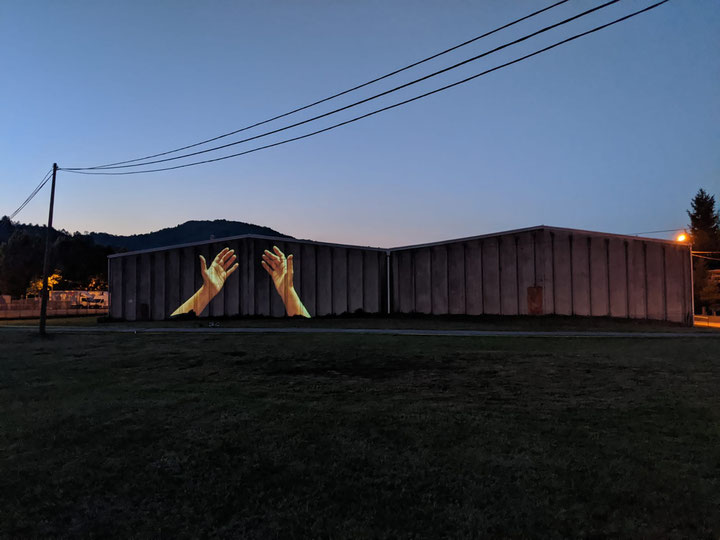One gets the impression that it has been sufficiently elaborated what an increased digitalization and databases (as dominant means of knowledge production) bring to our lives, archives, memories and histories. In addition, there is a widespread belief that race and coloniality are external to European contemporaneity. But despite such impressions and beliefs, we need to rethink how they are related to our positions and possibilities within a system of violent governmentality that nowadays, as several authors have recognized, administers death rather than life.
Hyper-digitalization and deathscapes
It should be remembered that the socio-political context in which new technologies have been developing in the 1990s is different not only with respect to the spheres of the so-called East and West, but also within the East itself, and that the collapse of socialism and integration into capitalism took different paths. For example, in those years, Bosnia and Herzegovina was exposed to a brutal war aggression.
Just like Marina Gržinić has pointed out (In a Line for Virtual Bread 1996), at the end of the 20th century, while the world has been talking about the promises of virtual bodies floating around, we literally had material bodies coping to survive, mass killings, war crimes and crimes against humanity in the heart of Europe. What she revealed was a clear colonial divide within a medium that has been undoubtedly perceived as democratic.
Similar to Gržinić, in the summer of 1995, Arthur and Marilouise Kroker published a text titled “Windows on What?” (CTheory, 24.8.1995) dealing with two events that took place on the same weekend in July that year. These events were the shipping of Windows 95 in Redmond, Washington, and the fall of the UN “safe area” of Srebrenica and the genocide of Bosnian Muslims committed by Bosnian Serb forces in Bosnia and Herzegovina. As the Krokers recognized, while critically analyzing the technological acceleration and hype in the West that occurred simultaneously to the genocide in Srebrenica, what took place in these two locations was, in their words, the bitter division of the world and of human flesh into privileged “virtual flesh” on the one hand and what they called “surplus flesh” on the other. More precisely, the result of this division was a total indifference regarding different forms of violence to which “surplus flesh” was exposed, and which has been registered by all these brand-new technological devices.
Today, our reality is both that of hyper-digitalization and of deathscapes, mass graves and human remains being dispersed through them. What we get as a product of the regime of digital and of necropolitical reality is (Bosnian) forensic contemporaneity.
Therefore, in order to understand the interrelations of the digital and the forensic turn (as Eyal Weizman named the prevailing forensic methodology and aesthetics conducted through different forums, for example that of international humanitarian politics, law and art) I propose to relate the notion of database to changes in governmentality and sovereignty, acknowledging the coloniality of power (Anibal Quijano) as its active element in the present.
Here, the term ‘coloniality’ identifies and describes the living legacy of colonialism in contemporary settings, that has survived formal colonialism and became integrated in succeeding political and social orders.
Database, necropolitics and digital coloniality
Although the work of Michel Foucault from the 1970s on the notions of governmentality, biopolitics, and biopower was an important starting point for rethinking archives and the managing of life that has marked the post-World War II condition in the West, it can hardly explain our current reality, including Bosnian forensic contemporaneity. It needs to be re-politicized from the perspective of those who have been and are still “outside,” those who did not and do still not count as valuable enough for biopower.
Achille Mbembe, in his text “Necropolitics” (Public Culture 15, 2003), provided an important link by developing the concept of necropolitics to conceptualize “contemporary forms of subjugation of life to the power of death” that are related to pure abandonment, state of exception, technologies of destruction and war machinery. To quote Gržinić who elaborated further on this, if the logic of biopolitics is to “make live and let die,” necropolitics says, “let live and make die” (it administers death rather than life). As she recognizes, “[t]he most important element of this shift is that is not just a division and differentiation, but is established along the colonial/racial divide,” since “necropolitics functions through measures of intensified racialization” and though the naturalization of cultural racism, especially from the 1990s onwards. These shifts of power are, as Gržinić writes, also marked with forced erasures of the past and a brutal de-historicization whose result is a suspension of history and whose primary intention is to discard any alternative within it.1
In this context, my argument is that if the archive is a biopolitical instrument with a crucial role in governing, then databases and forensic contemporaneity should be conceptualized in relation to the shift from bio- to necropolitics, from bio- to necropower. My major point is that databases, as an emergent major neoliberal technology, coexist with and embody changing relations within governmentality and play a crucial role today, when the coloniality of power is mainly digital.
Digital technologies and databases are setting new conditions of the global, neoliberal capitalist and colonial system. They are facilitating governance and the control of human beings, from the human body becoming an archive, biometric data on refugees, migrants, forensic archives, financial data, to data mining. They are presented as ethically correct since they are used to calculate/predict what would be „the lesser evil“ (Eyal Weizman) that we might accept or approve in order to prevent greater harm – which is an argument used to defend all kinds of legal exceptions, from managing war to financial speculation. As Weizman writes, calculation as a technique of government is undertaken by the powerful and “'on behalf' of those it subjugates.” This power is based on “the very ability to calculate” and “to act on these calculations.”2
Moreover, this faith in data and its accompanied politics, practices and forms of knowledge production and visibility, are configuring and shifting the relations of contemporary subjects and objects and their realities. They create conditions and promises, produce relations and conditions of the reality we live/die in.
Therefore, in order to challenge our necropolitical reality, it is necessary to critically rethink, politicize and de-normalize the regime of (digital) coloniality including its technologies of power.
1 Marina Gržinić, „Exclusion and the Dead,” Parse 8, 2018, https://parsejournal.com/article/exclusion-and-the-dead/
2 Eyal Weizman, The Least of All Possible Evils, Verso, 2012, p. 17.
Adla Isanović’s The Regime of Digital Coloniality: Bosnian Forensic Contemporaneity was published in 2021 with CEEOLPRESS, Frankfurt am Main.



